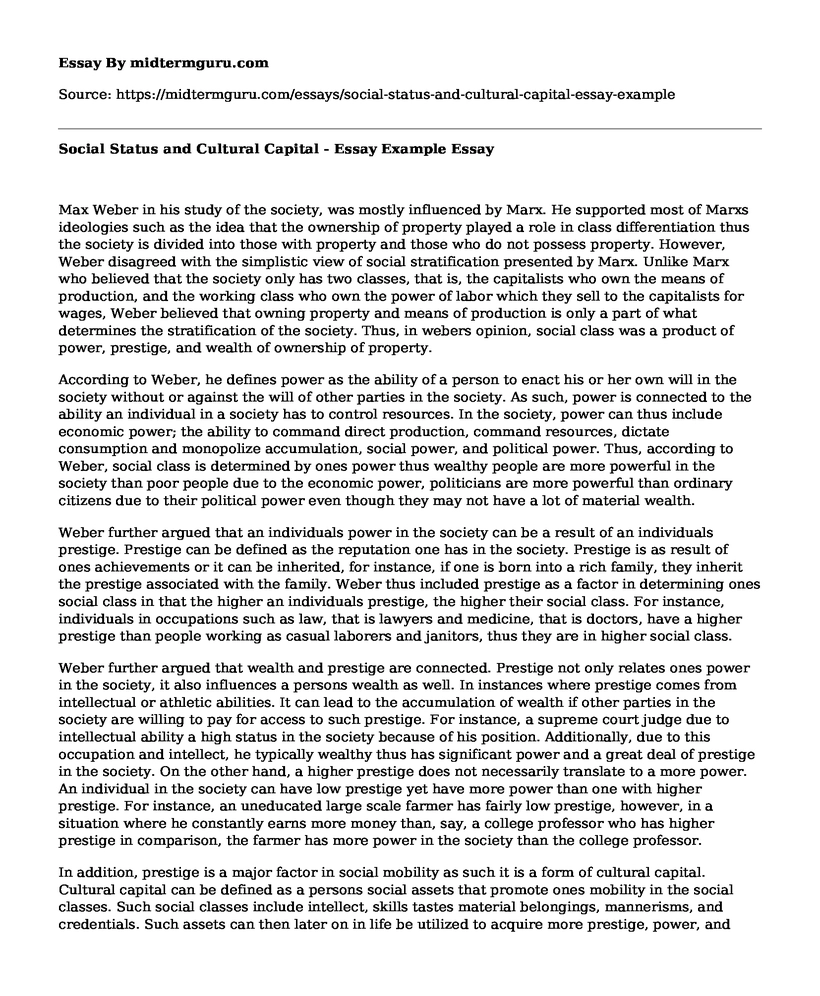Max Weber in his study of the society, was mostly influenced by Marx. He supported most of Marxs ideologies such as the idea that the ownership of property played a role in class differentiation thus the society is divided into those with property and those who do not possess property. However, Weber disagreed with the simplistic view of social stratification presented by Marx. Unlike Marx who believed that the society only has two classes, that is, the capitalists who own the means of production, and the working class who own the power of labor which they sell to the capitalists for wages, Weber believed that owning property and means of production is only a part of what determines the stratification of the society. Thus, in webers opinion, social class was a product of power, prestige, and wealth of ownership of property.
According to Weber, he defines power as the ability of a person to enact his or her own will in the society without or against the will of other parties in the society. As such, power is connected to the ability an individual in a society has to control resources. In the society, power can thus include economic power; the ability to command direct production, command resources, dictate consumption and monopolize accumulation, social power, and political power. Thus, according to Weber, social class is determined by ones power thus wealthy people are more powerful in the society than poor people due to the economic power, politicians are more powerful than ordinary citizens due to their political power even though they may not have a lot of material wealth.
Weber further argued that an individuals power in the society can be a result of an individuals prestige. Prestige can be defined as the reputation one has in the society. Prestige is as result of ones achievements or it can be inherited, for instance, if one is born into a rich family, they inherit the prestige associated with the family. Weber thus included prestige as a factor in determining ones social class in that the higher an individuals prestige, the higher their social class. For instance, individuals in occupations such as law, that is lawyers and medicine, that is doctors, have a higher prestige than people working as casual laborers and janitors, thus they are in higher social class.
Weber further argued that wealth and prestige are connected. Prestige not only relates ones power in the society, it also influences a persons wealth as well. In instances where prestige comes from intellectual or athletic abilities. It can lead to the accumulation of wealth if other parties in the society are willing to pay for access to such prestige. For instance, a supreme court judge due to intellectual ability a high status in the society because of his position. Additionally, due to this occupation and intellect, he typically wealthy thus has significant power and a great deal of prestige in the society. On the other hand, a higher prestige does not necessarily translate to a more power. An individual in the society can have low prestige yet have more power than one with higher prestige. For instance, an uneducated large scale farmer has fairly low prestige, however, in a situation where he constantly earns more money than, say, a college professor who has higher prestige in comparison, the farmer has more power in the society than the college professor.
In addition, prestige is a major factor in social mobility as such it is a form of cultural capital. Cultural capital can be defined as a persons social assets that promote ones mobility in the social classes. Such social classes include intellect, skills tastes material belongings, mannerisms, and credentials. Such assets can then later on in life be utilized to acquire more prestige, power, and property and also to acquire more cultural capital. However, a person without adequate cultural capital finds it hard to acquire it as they do not have the means. As a result, social capital is typically a source of social inequality.
In the recent past, it has been noted through various studies that a majority of children do not leave the socioeconomic level of the families they were brought up in. with regards to the theory of cultural capital, this inability to gain social upward mobility is due to the fact that it becomes difficult for those who are poor in the society to gain the type of cultural capital valued in the society so as to get more prestige thus having more power and wealth to achieve upwards social mobility.
For instance, education, that a college degree, is a form of a very vital cultural capital. Thus, a person living in poverty has to have an education in order to facilitate their upward mobility. However, due to their poor state, such a student cannot be fully focused on education as he/she has to help their facility through other activities as part-time jobs to supplement the low family income. As a result, the student is bound to neglect some of the school work thus resulting in poor grades thus lowering such a students chances of getting into a good college. As a result of this cyclic nature, people living in poverty find it harder to advance to higher social classes.
Cite this page
Social Status and Cultural Capital - Essay Example. (2021, Jul 02). Retrieved from https://midtermguru.com/essays/social-status-and-cultural-capital-essay-example
If you are the original author of this essay and no longer wish to have it published on the midtermguru.com website, please click below to request its removal:
- Essay on Chosen of a Non-Profit Organization for Donation: UNICEF
- Use and Development of Systems That Promote Communication - Assignment Example
- Paper Example on Verbal Judo in Correctional Institutions
- Paper Example on Ethnic Discrimination
- Causes and Effect Technology Have on Personal Relationships - Essay Sample
- Gender Roles: A Cultural Construct? - Essay Sample
- Effective Listening: The Key to Effective Communication - Essay Sample







